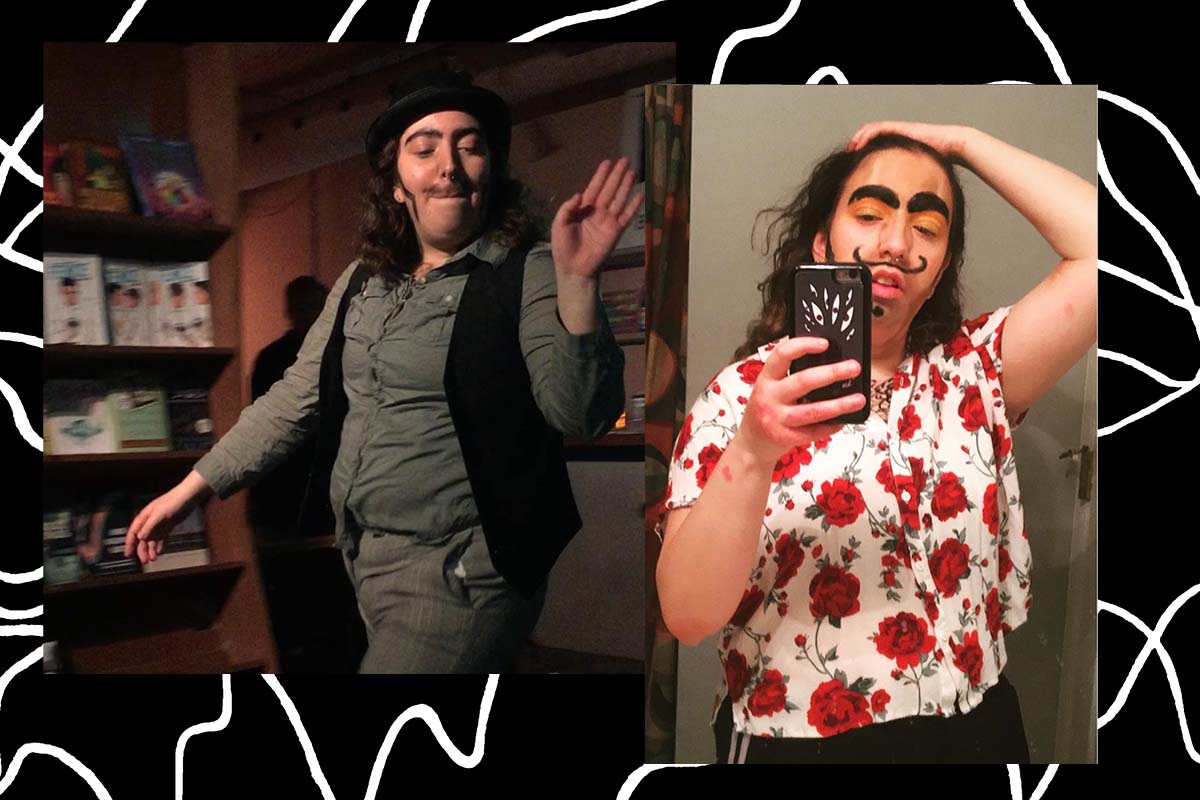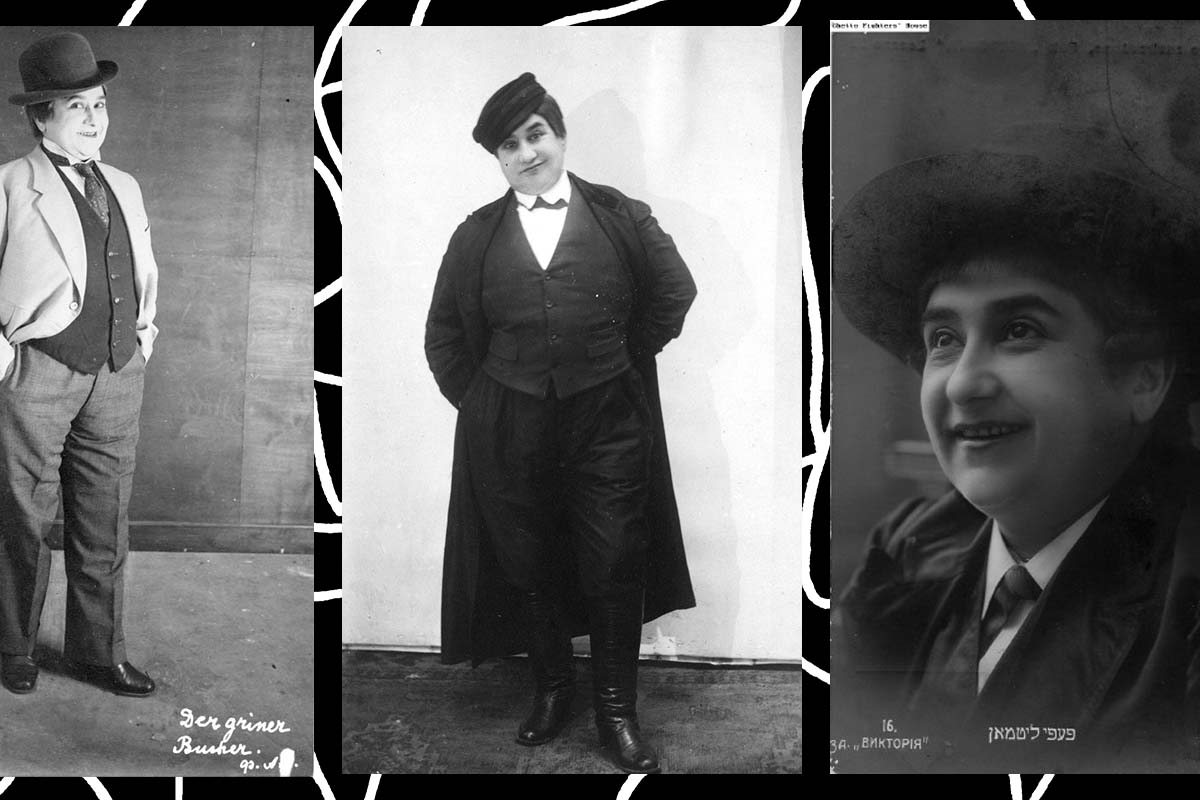Thanks to the popularity of shows like RuPaul’s Drag Race and The Boulet Brothers’ Dragula, drag queens have been enjoying a massive, unprecedented audience. But where are the kings? Drag kings have been around since drag as an art form began which some people trace all the way back to Shakespearean times, and are just as talented, fierce, and amazing as their queen counterparts. And while there is a rich tradition within Jewish culture of men dressing in drag on Purim, there is also a fantastic history of women dressing in male drag in Yiddish theater and beyond.
Case in point: Pepi Litman, the drag king, singer, actor, and star of Yiddish theater and the vaudeville circuit of the early 20th century. Pepi traveled around with the famous troupe Der Broderzingers and frequently performed in male drag, something almost unheard of at the time, especially in Jewish circles. Pepi was a chameleon king, able to transform into anything from a well-dressed dandy in a three-piece suit, ready to charm and flirt with the ladies, to a religious Hasid, complete with tzitzit, payos, and a Talmud tucked under his arm. By dressing in Hasidic garb, Pepi was able to poke fun at the stringent gender roles which governed Jewish life at the time (and still do, for many people). Pepi paved the way for an exciting tradition of Jews in drag, from Barbara Streisand in Yentl to modern Jewish drag stars like Sasha Velour and Miz Cracker.
Pepi Litman was born in the 1870s (her exact birthdate is not known) as Pesha Kahane in the city of Tarnopol (today known as Ternopil) in what is modern-day Ukraine and was part of Galicia at the time. Her family was poor, and she worked to help them survive from a young age. As luck would have it, she began working as a maid in a boarding house that just so happened to be owned by the family of Max Badin, an actor of film, stage, and vaudeville and one of the early celebrities of Yiddish theater in Europe and America.
This connection led to Pesha’s interest in performing, and she soon became involved with the famous troupe Der Broderzingers, or the Broder Singers, a group of actors and singers from Brody, Ukraine who traveled all over Eastern Europe performing songs, skits, and plays. While the group used costumes and songs to poke fun at Jewish life, Pesha, as Pepi, completely changed the game, dressing in full drag at a time when just wearing pants was scandalous enough for a woman.
Her humor, singing voice, and ability to capture a room were legendary and astonishing. In 1910, journalist M.J. Landa wrote about the transformative power and utter delight of Pepi’s performances in The Jewish World: “She was the ‘star’ of the program… The moment she stepped on the stage, dressed as a Galician youth, with skull cap and ringlets, the whole atmosphere of the room was different. It was dominated by a personality… She is the incarnation of the joyous spirit of the Jew, with moments of pathos and sentiment. Listening to her singing… I forgot that I was in Galicia—forgot the horrible depressing poverty with which I had been surrounded for some days.”
Pepi wasn’t only interested in performing. She was well-educated, spoke several languages, and involved in Yiddish literary circles. She was also an observant Jew, keeping kosher and celebrating Shabbat. Her ability to playact at Jewish life while still celebrating every aspect of it, culturally and religiously, is nothing short of incredible.
Pepi eventually married Jacob Litman, one of the Broderzingers who also ran his own traveling theater troupe. When he died, she took it over, continuing to dazzle the world and going all over Europe, from Vienna to New York to Odessa. After her final tour in the late 1920s, she fell ill and died in 1930, at the age of 56. That she accomplished so much in a relatively short lifetime — at a time when women and people who defied gender norms were so subjugated — is nothing short of a marvel, in my humble opinion.
Sadly, as secular Yiddish culture began to fall off in the aftermath of the Holocaust, Pepi’s story and life began to fall out of the collective historical memory. However, as we see a contemporary revival of Yiddish language, culture, and history, it’s the perfect time for Pepi and figures like her to claim their own piece of historical significance.
Pepi, and the drag kings of history like her, paved the way for today’s rich, vibrant drag king scene, of which I proudly take part in. Today, you can find drag kings and gender performers (also called “drag things”) in pretty much every queer scene in every big city. Kings like Landon Cider, the winner of the third season of The Boulet Brothers’ Dragula, and Hugo Grrl, the winner of the first season of New Zealand’s House of Drag — and the first drag king and the first trans man to appear on reality television — are bringing even more mainstream attention to the world of drag kings.

But Pepi represents not only an important piece of queer history, but Jewish history as well. As a queer Jewish drag king myself, seeing Pepi’s story inspires me to continue to be my authentic, Jewish self, both in and out of drag. She’s inspired me to incorporate pieces of Jewish culture into my own performances, such as playacting as Tevye from Fiddler on the Roof or joyously lip-syncing the Dead Kennedys classic anti-facist anthem, “Nazi Punks Fuck Off.” Even my drag name, Boris G. Babka, comes from my favorite Jewish food of all time, chocolate babka. Pepi’s memory gives me the confidence and pride to be my most authentic self, fake mustaches notwithstanding: Jewish, queer, and a king.
Images of Pepi in header via Forward Archive and Beit Lohamei Haghetot.



